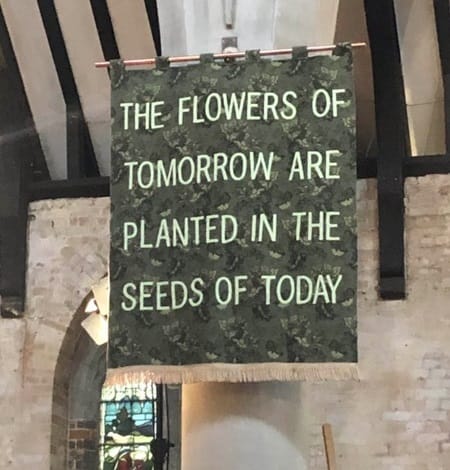We Are Nature – the campaign to change the dictionary definition of Nature

The Campaign
The dictionary definition of Nature lags behind the new scientific and cultural consensus – that humans are part of Nature, not separate from it. We want to change that.
In collaboration with Frieda Gormley and Javvy Royle (founders of House of Hackney), we are campaigning to persuade the main UK English dictionaries to change the definition of the word Nature to one that includes humans, as all dictionaries currently exclude humans from their definitions.
The aim of the project is to highlight our connection and interdependence with Nature. We want our dictionaries to reflect the scientific fact and overwhelming consensus that humans are part of Nature, just as animals, plants and other products of the earth are.
We believe that our separation from, and misconceived superiority over Nature has contributed to the ecological crisis we find ourselves in today. Updating the definition of Nature is a powerful tool to amplify the message that we are entirely dependent on the wider web of life, of which we are only a very small part. There is consensus amongst leading scientists globally, that there is a desperate need to protect this ecosystem. You can join in the campaign, read our open letter and sign the petition at wearenature.org.
How it Began
Last year, Lawyers for Nature started working with House of Hackney to help them appoint a voice for Nature and Future Generations to their board of directors (more here). Frieda gave a talk about this at the Anthropy festival in November, during which an audience member read aloud the Oxford English Dictionary definition of the word Nature. There was a stunned silence when it transpired it not only excluded humans, but appeared to actively place humans in opposition to the other features of the natural world:
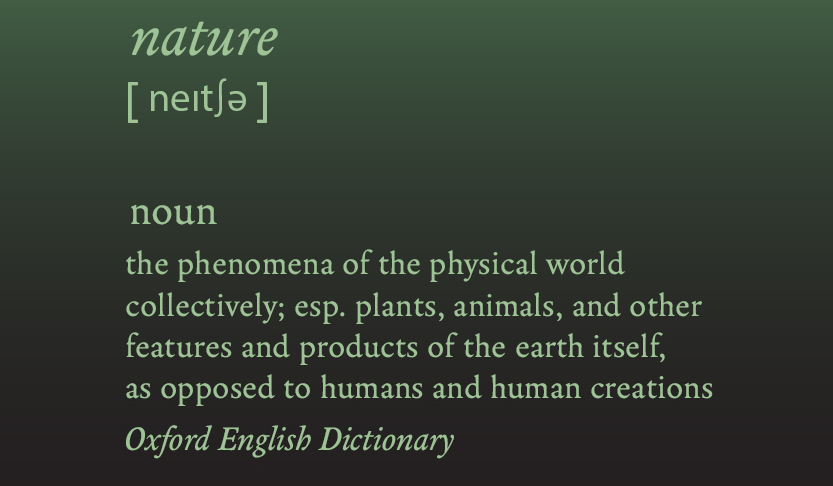
Frieda and Javvy were initially dismayed – but became impassioned. They asked us if we were interested in working with them to campaign on getting the definition changed – and we said yes!
A Potted History of our Separation from Nature
There isn’t enough space here to do this justice, but it is important to consider why English dictionaries define Nature in this way. The definitions are essentially reflecting what has been the hegemonic Western worldview of human dominance and superiority over Nature for a long time. As Vining et al outline: “Enlightenment brought with it feelings of domination over Nature’’, and this was propagated by advances in science and technology which “enhanced our ability to control and transform nature” for our own benefits. Urbanisation and industrialisation have further advanced our alienation and separation from Nature.
Yet though this is the currently dominant worldview in our society, it didn’t used to be – and there have always been counter-currents challenging this approach, such as the Romantic movement. Before our need to subjugate and extract from nature, people thought of themselves as part of ‘the cosmos’ (which remains referenced in an obsolete definition of nature in the OED, see below), and many argue we were once much more closely connected to Nature than we are today.
In the last century, scientists and academics have argued that our separation and superiority over Nature is contributing to our ecological downfall. In 1967, Lynn White famously argued that what we do about ecology depends on our idea of the “man-nature relationship”. Despite these advances, the presiding view of Nature remains the one which separates us from it. Politics, philosophy, economics and law are still catching up.
The definitions of Nature are therefore the tip of the iceberg of the clash between the worldviews of extractive capitalism and a politics rooted in ecology. We are asking the dictionaries to reflect the fact there is an abundance of scientific research, an emerging ecocentric worldview, and cultural countercurrent which places us within Nature – and it is time they caught up.
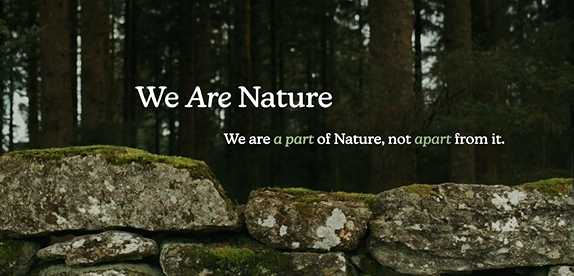
Crowdsourcing a Definition
We put the question to academics, writers, activists, environmentalists and lawyers asking everyone the question, ‘How do you define Nature?’ The overwhelming consensus was that they depicted humans being part of Nature. Clearly the dictionary definition is outdated.
Many of the definitions we received were beautiful and poetic, for example:
“We are nature, defending itself. And nature is us: every interdependent living being on this precious life giving planet.” Caroline Lucas
“The greatest group noun of them all; the entangled web of planetary life of which humans are inextricably part.” Robert Macfarlane
“The entirety of life on Earth, including the ecosystems and physical features and phenomena that support or influence it.” Dr Sue Miller
“The whole natural world, encompassing all animate entities and physical forces, among them plants, animals, rocks, rivers, winds and human beings; the living Earth and its expressions; the cosmos or universe.” Rob Percival
Such responses spurred us on to believe there was merit in asking for a change to the current definition.
The Submission to The Oxford English Dictionary
The Oxford English Dictionary (‘OED’) is the leading authority on definitions in the UK. So, our first step was to ask them to modify their entry for the word Nature.
The OED is a historical site and they aim to reflect the current and most frequent usage of words. They update entries for words which change over time, but they do not dictate or state how words should be used.
We noticed that there was a wider sense of the word Nature within the long list of meanings of the word and behind the subscription paywall of the OED’s website. However it was described as being ‘obsolete’, dated from 1850–73.
“In wider sense: the whole natural world, including human beings; the cosmos. Obsolete.”
(The full entry has 32 meanings of Nature, 12 of which are labelled “obsolete”. Thank you to Amy Street and Rob Percival for spotting these wider definitions within the ‘meaning and usage’ section of the OED’s website.)
So, we got to work to persuade the OED to revise their entry to bring back this ‘obsolete’ definition which appeared to reflect the sentiments of so many of our contributors. We had little knowledge of the inner workings of the OED, and were fortunate to make contact with Professor Emeritus John Considine from the University of Alberta, Canada, an expert in English language and early modern culture. He was incredibly generous with his time and informed us that the OED would require evidence of usage of the word Nature including humans from 1850 to the present day, in order for them to make a revision.
We assembled a selection of quotes from print publications which described humans being a part of Nature from 1850 to the present day and submitted that, along with 50 informal definitions of Nature from our contributors. We presented the evidence to the OED and submitted:
- There is extensive published evidence for the use of the word Nature to refer to human beings from the nineteenth century to the present day;
- This use of the word reflects current usage (as evidenced by the informal working definitions);
- Revising the definition to give weight to the historical and current uses of the word would set the historical record straight, and make an important statement about current usage;
- Therefore, the sense (or definition) of Nature that appears in the results list when a user of the dictionary searches for the word should be a version of the wider definition – the one which includes humans (sense IV.11.b)
We then waited with baited breath…
The Oxford English Dictionary’s Modification
In March we received an email from the OED which said:
“‘editors have now updated the relevant senses of nature to take account of later evidence. Thank you for helping to draw our attention to this recent history.”
In practice, they modified the entry of Nature to the extent that:
- The wider sense of the word now reads: “More widely: the whole natural world, including human beings.”
- It is no longer described as being ‘obsolete’ – the word ‘obsolete’ has been deleted from the entry;
- The OED have included evidence of usage up until the present day;
- The date now reads: “1850 - ” (there is no end date); and
- After the entry which excludes humans, they inserted the words: “Sometimes difficult to distinguish from sense 11b (the wider sense) esp. in early use.” Which creates a link between the (main) sense of the word to this wider definition.
The opening definition is still the one which excludes humans from Nature. The OED explained this is based on current usage and that Nature "as a phenomenon distinct from humankind remains the most frequently used meaning in current English." This echoes the discussion above that the dominant hegemonic worldview of Nature remains the one which separates us from it. However, the OED decided to make the whole entry for the word Nature freely accessible instead of behind the paywall, so that anyone searching for the word Nature will be able to see the wider sense of the definition.This is to be commended. They further stated that they will "continue to monitor developments in the word and consider updates accordingly." Therefore, the more we describe ourselves as being a part of Nature, the more likely this is to be updated in the future.
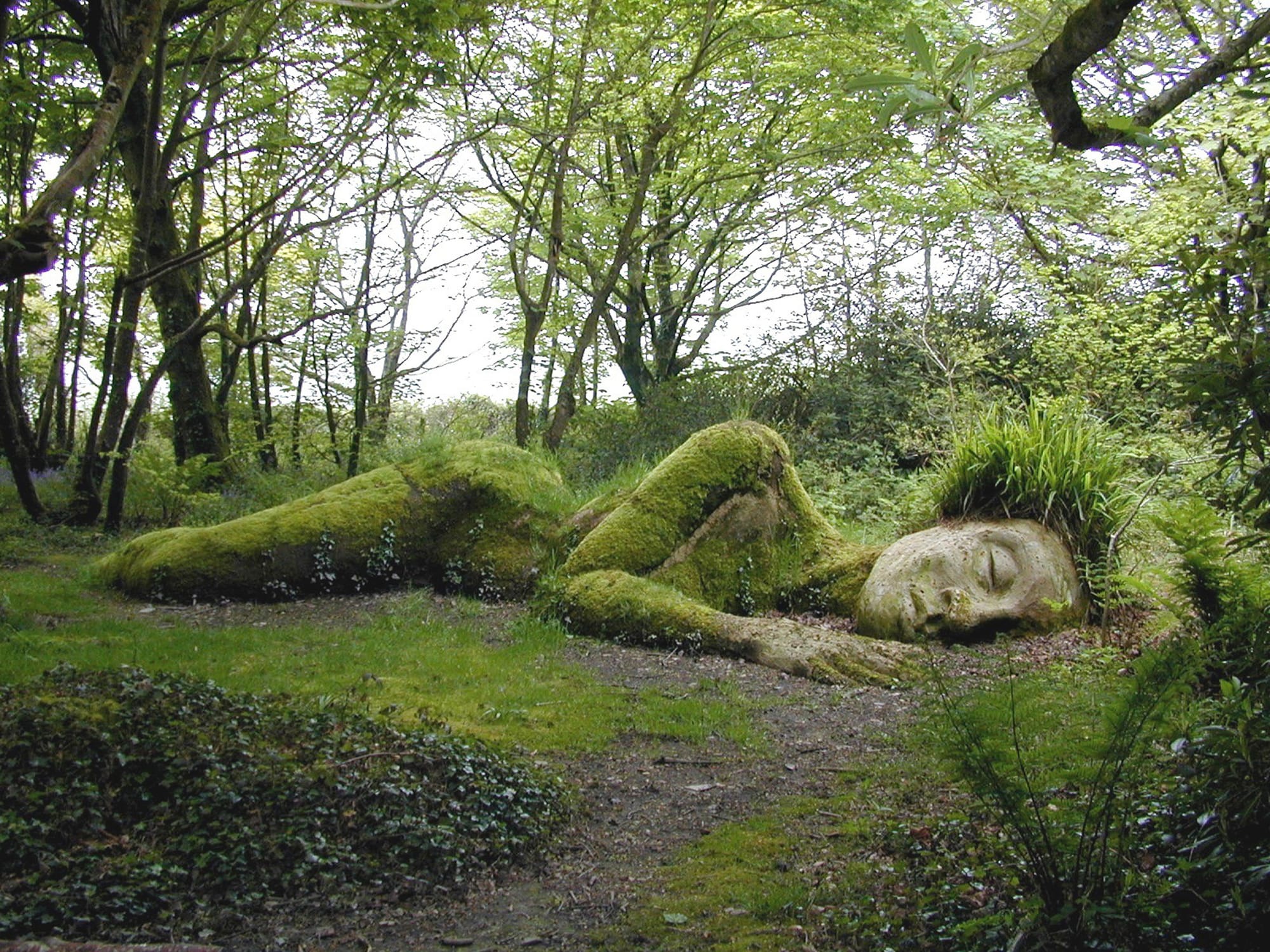
Why This Matters
In The Self Delusion, Professor Tom Oliver (who has contributed to the project), writes:
“We have allowed this damage to the Earth’s ecosystems because we have often seen nature as something external to us, something to be conquered and used. It is becoming increasingly clear, however, that continued destruction of nature will simply accelerate our own destruction.” (p 107)
He cites the Intergovernmental Science-Policy Platform on Biodiversity and Ecosystem Services (IPBES), the world’s biggest assessment of nature. In its first global assessment report in 2019, scientists and policy makers considered the human relationship with Nature, recognising that:
“a range of views exists, at one extreme, humans and nature are viewed as distinct; at the other, humans and non-human entities are interwoven in deep relationships of kinship and reciprocal obligations.”
Dictionary definitions are vital and provide a cornerstone for understanding language and for communicating how we see ourselves and the world around us. They have an impact on laws, regulations, education and society at large. They also act as a mirror, reflecting political values of the time. That is why we think it is important that the definition of the word Nature should not reflect the human-centric view of Nature as ‘other’, rooted in colonial and capitalist cultural history, that depicts the non-human world as something which exists for humans to dominate and destroy.
This view is outdated and no longer in line with scientific consensus – that we are a part of Nature. We want this campaign to encourage the dictionaries to catch up and to reflect the ecocentric world-view that we should live in a harmonious and respectful relationship with Nature, not just for Nature’s sake, but for the sake of our survival as a species.

This is reflected in a recent briefing from the European Environment Agency, ‘Exiting the Anthropocene? Exploring fundamental changes in our relationship with nature’, published in March 2023. This urged the need to rethink our relationship with Nature, stating that "humans are deeply interconnected with other life forms and ecosystems" and that a shift from the term ‘anthropocene’ "may be essential for moving towards a more sustainable future".
A question we need to ask ourselves is, do we want our definitions of Nature to reflect the ‘extreme’ end of the views which separate humans from Nature, or do we want our definitions to convey that we are a part of Nature, which can play an important part in the process of repairing our relationship with Nature, and helping us move towards a more stable future? We argue it should be the latter.
Join the Campaign
We now want to persuade the other dictionaries to follow suit, by either amending their definitions of Nature to include humans, or alternatively to ensure there is a wider definition which includes humans and is accessible for all to view when they search for the word.
If you would like to be part of the campaign, you can sign our petition and tell others about it! We have drafted an open letter which has been signed by many of our contributors and we plan to send this to the other dictionaries to ask them to make their own modifications. We have also launched a website for the campaign wearenature.org which will outline our project and how you can get involved.
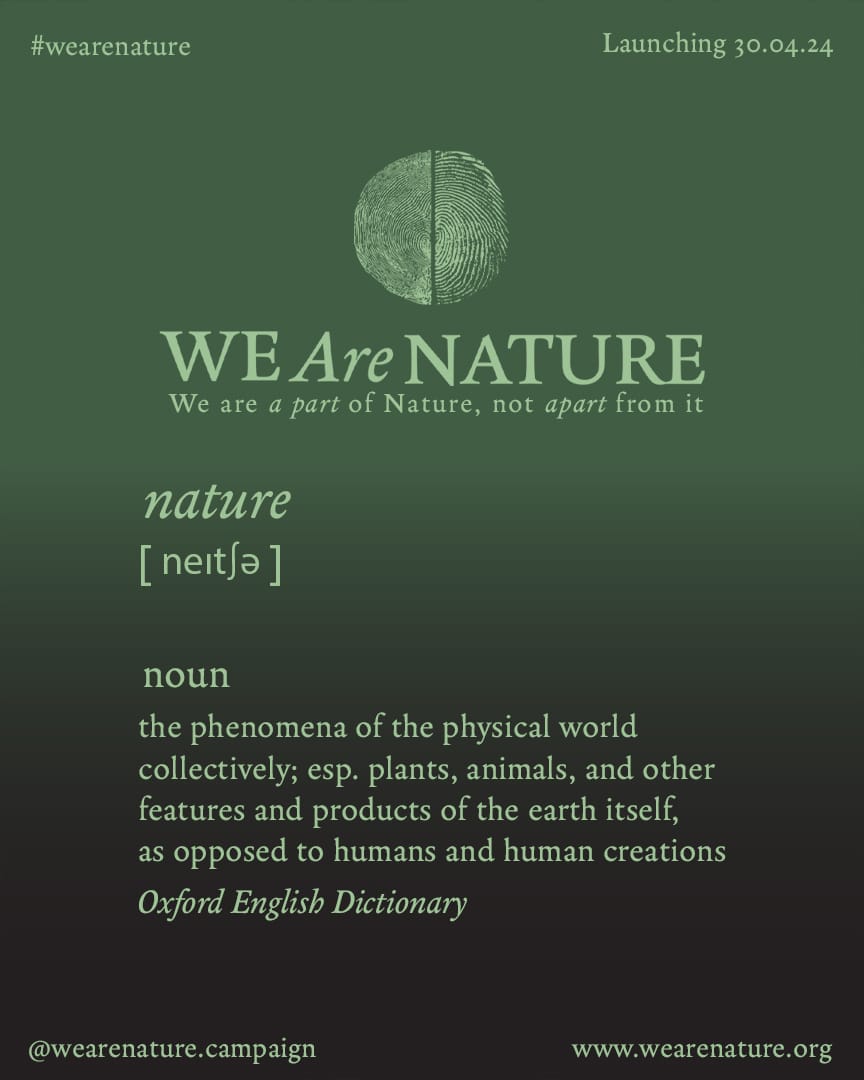
The Bigger Picture
Our work is not just to persuade dictionaries to update their definitions: this is important because it’s part of a movement to realign our society with what’s good for the rest of Nature as well. At Lawyers for Nature, much of our work is about cultural and legal change. For example, we are proponents of giving Nature legal rights is a mechanism to achieve that. Humans are a part of Nature, but we are a small part of a much wider, complex ecosystem, upon which recent history has demonstrated we are prone to inflict disproportionate harm. The current system of environmental laws and protections are simply not working. We believe that Nature in all its life forms has the right to exist, persist, maintain and regenerate its vital cycles, and we want Nature to have a voice and a say in our decision-making forums, businesses and third sector organisations.
The We Are Nature campaign is part of this movement: we don’t just need top-down legal change, but also cultural change for us to see ourselves as part of Nature and therefore protecting a world we are part of and live in.
As we say in our open letter:
“Changing the definition of Nature in this way is an important step in this movement towards protecting the intricate balance of life in the natural world, of which humans are an intrinsic part. We have an opportunity to shift the course we are on and bring ourselves back to a place of congruence with Nature, both in terms of how we define Nature, and how we protect it in practice. Only then will we begin to remedy our relationship with the natural world and put it on a truly sustainable footing. By campaigning for an inclusive definition of nature, we move further towards an understanding of humans as being part of something much bigger. This is part of the cultural change needed to enable us to find balance in and with Nature for the benefit of future generations.”
If you would like to support the campaign and sign the petition and read our open letter, head to wearenature.org.
With special thanks to Alex May (researcher at Lawyers for Nature) who contributed to this article.

